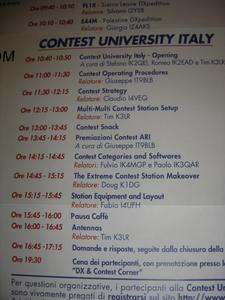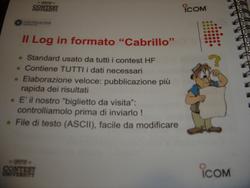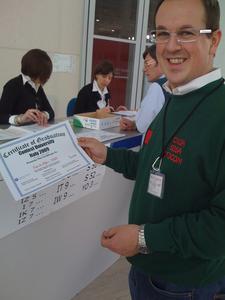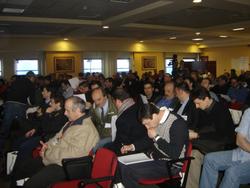 March 18, 2009 Editor: Ward Silver, NØAX | |||||
IN THIS ISSUE
NEW HF OPERATORS - THINGS TO DO Don't miss the opportunity to put the North Dakota flag sticker on your Year of the State QSO Party certificate as the ND QSO Party is happening. The OK and VA QSO Parties are also on the air, so you can bag all three on several bands! And then there's that WPX SSB festival of oddball calls--feel free to take part in the fun! BULLETINS Tack JE1CKA reports that the expansion of JA privileges on 7 MHz will occur during the upcoming CQ WPX SSB contest, beginning at 1500 UTC on March 29. That is 0000 JST on March 30 in Japan. (Thanks, Dave KM3T) BUSTED QSOS That fine photo of Hamad 9K2HN in the previous issue was snapped by John VE3EJ, not Dave K5GN, both visiting the Middle East on business and getting confused in the editor's tiny mind. CONTEST SUMMARY Complete information for all contests follows the Conversation section March 21-22
March 28-29
NEWS, PRESS RELEASES, AND GENERAL INTEREST
This year at Visalia DX convention there will be a new attraction -- the Northern California Contest Club will be holding a Contest Academy on Friday from 1 PM until 5 PM. These focused contest training sessions, CTU's for short, are popping up all over as the photos in this issue attest. CTU Pioneer Tim K3LR and Dayton Contest Forum Moderator, Doug K1DG traveled to Italy, one of the hot-beds of contest activity, for the first-ever Italian CTU, hot on the heels of the well-attended English CTU. And let's not forget the original CTU being held at the Dayton Hamvention again this year on Thursday, May 14th! Radiosport - it's hot! Also coincident with the Visalia convention is the annual Friday night Contest Dinner on April 17th. Jeff WK6I has provided the ticket sales sponsorship on his company Web site. WPX Contest Director, Randy K5ZD has been mighty busy lately. First, there is the new records database and now he has published a WPX Rules Frequently-Asked Questions (FAQ) based on emails he receives from WPX contesters. He also notes that the contest is thriving--SSB entries were up about 20% in 2008 and CW almost 10%. Randy's energy and efforts are greatly appreciated! The US Coast Guard has http://www.uscg.mil has announced that due to budget concerns, they would be closing down the 24 LORAN-C (Long Range Aid to Navigation) stations at the end of fiscal year 2009. Older hams will remember the power and frequency limitations on 160-meters to avoid the LORAN-A stations. (Thanks, Paul K0JPL) In another sign of the times, Jim W0MJY announces that Burghardt Amateur Center Inc will now be called Burghardt Radio Repair, Inc and will no longer sell amateur radio transceivers and accessories. All backorders have been cancelled. Burghardt will continue to provide radio repair service as it has become a very busy business. Burghardt is one of ham-dom's oldest radio outlets, so it's sad to see them changing to a repair-only business, but it's also good to hear that radio repair is going to keep their doors open. (Thanks, Ken K0PP) The Amateur Radio Newsline for March 13 contains a report from CT1FBF that ham radio in Portugal is getting a makeover with three new license classes, including lowering the minimum age for a licensee to 12 years. There will be an entry-level license with HF privileges and a mandatory two-year operating period. Hams that can read Portuguese (na fala Portuguese, here, unfortunately - Ed.) will find more details at this online blog. March madness indeed - Scott W3TX has a 140-foot SuperBertha antenna system if you're able to part with the equivalents of a few IC-7800's! It has that neighbor-pleasing, no-guy-wires look, too! Scott is also sponsoring a prize drawing for three nights at the Dayton Crowne Plaza during the 2010 Hamvention. Thomas NZ4O is now generating propagation forecasts for specific contests. They can be found every Friday on the new COL e-list. Here's an example forecast. His propagation e-list covering LF through UHF is moving from its existing site to become available on contesting.com. The creators of "Shackbox" announce that the new "Carbon Edition" is available for free download. Shackbox is a collection of more than 150 useful pieces of software, data, graphics, and the like for electronics, ham radio, and mathematics. Shackbox is an open project, so if you would like to contribute, contact information is available on the Web site. (Thanks, Herve F0FAK) I know I count many readers that were, are, or may be model rocketeers. Those of you that raised your hand to shield your eyes and looked heaven-ward in reflex will be glad to know that model rocket motor fuel is no longer classified as an explosive. Model rocketry is a great hobby for the budding scientists out there (and in all of us) with the occasional wireless connection. Come to think of it, wouldn't a combination rocket-radio contest be a blast? From the March 6 edition of the ARRL Letter, "Registration is now open for the next USA Amateur Radio Direction Finding Championships, June 5-7, 2009, in Boston, Massachusetts. Radio-orienteers of all skill levels will gather for a practice day, followed by two days of intense competition -- first on 2 meters and then on 80 meters. This year's USA Championships will be combined with the IARU Region 2 championships." I'm putting this in the News section because it obviously will be news to some operators that transmitting USB signals with a carrier frequency higher than 14.347 MHz puts a significant portion of your signal out of the band! The radio's displayed frequency is the carrier frequency, so if you are transmitting a 3 kHz-wide signal, 14.347 is as high as you can comfortably tune. Many stations were observed making contacts in violation of the rules during ARRL DX Phone. No excuses, folks! Know the band limits and respect them!
Mark K6UFO reports that NASA wants your opinion in naming the International Space Station's Node 3 - a connecting module and its cupola - before the two segments travel to space and are installed on the orbiting laboratory. Voting will be open until March 20 and the winning name will be announced in April. Lee K0WA writes with the welcome news of the Kansas QSO Party returning in August! Those of you pursuing the Triple Play Award or the Year of the State QSO Party will note that Kansas has not had a QSO party for quite some time, so please make plans in your contest calendar to participate. The West Coast contest community and Northern California Contest Club lost a leading member last week as Marc Ziegler W6ZZZ died unexpectedly from a cerebral hemorrhage on March 13th. Marc was active on RTTY and an active supporter and promoter of the California QSO Party, the NCCC-sponsored Thursday night Sprints and other contest-related activities. (Thanks, Bob N6TV) Web Site of the Week - Marconi? Or Popov? Russians are marking the 150th birthday of the inventor they prefer to remember as the inventor of wireless communications. Russia Today has a story on Aleksandr Popov you may enjoy reading as another account of early radio. WORD TO THE WISE Terminator--No, not the governor of California! The line between night and day as the world turns on its axis! Gray line propagation happens all year long, but around the time of the vernal and autumnal equinoxes (and the latter occurs on Friday), the terminator runs north-south. This seems to create some interesting propagation, even at low solar flux levels. Those contesters in the Russian DX Contest this weekend may find good hunting on the polar paths as a result. SIGHTS AND SOUNDS With the 2009 ARRL DX CW all over, why not check out the PJ2T hour-by-hour breakdown as wellas some photos. The "Photo Album - Contest" link takes you to a collection of pictures, each with a caption at the bottom. You'll see that we sound better on the air than we look in the photos. (Thanks, Geoff W0CG)
Contest Club Finland's quarterly Web-journal PileUP! again welcomes contest related articles, news, short stories, photos, humor etc. to be published on-line at the end of March. Send any material to oh1wz@sral.fi. (Thanks, Ilkka OH1WZ) RESULTS AND RECORDS Radio-Sport on-line magazine has some nice run-up stories to this weekend's Russian DX Contest and is keeping track of those WRTC operator ratings as the final contests are run. Who will take the top positions in each region? There appears to be a problem for AOL users emailing ARRL DX Phone log to dxphone@arrl.org and it seems to be on AOL's end. If you are an AOL user, try sending your log to DXphone@arrl.org using a different email address, if possible. (Thanks, ARRL Contest Branch Manager, Sean KX9X) The results of the 2008 W/VE ISlands QSO Party are now posted online. Look for updated rules and dates for 2009 on the Web site soon. (Thanks, John WA4JA) Keep your eye on the 3830 Soapbox site managed by Mike N7WA. As the scores with comments come in, they are collected and summarized for your reading enjoyment! It has become common for more aggressive spam filters to reject or modify emails with contest log submissions. If this happens to you, send an email to the contest manager right away so they can change the spam filter or notify their ISP. OPERATING TIP I've published discussions about "when does the contest end?" in the past - well, when does the contest begin? More specifically, when does your operating time clock start ticking? In a 48-hour contest, this may not be a Big Deal, but in contests with limited operating time categories, it might matter a lot. The operating clock should be running when you begin listening - not when you make your first call and not when you make your first QSO. In WRTC, the operators turn the radio off for a 10-minute period before the contest starts to prevent loading up a band map, soliciting callers, looking for a multiplier to work, etc. The same should go for you. If the power switch is ON and so are the headphones - your operating time clock is ON, too! TECHNICAL TOPICS AND INFORMATION If you're an ARRL member, have you tried the new on-line QST archive? Everything from 1915 through 2005 is now available! Good stuff abound! Here's your assignment; find the October 1966 issue of QST and look for the photo of Don Miller W9WNV. While you're there, enjoy the classic bit of humor by W6ISQ and a nice article summarizing CW keying issues by W1DF that are just as important today as they were 32 years ago. With the solar cycle repeatedly pressing the "snooze" button, we find ourselves relying on the Internet for cross-the-pond communications more and more. But who tends the terabits traversing the ocean floor? Why, Rennie the Scotsman, that's who! Maybe we could have him work on the ionosphere, too... You don't want to start the contest late, do you? In the relentless quest to begin that first CQ "on the dot", science has pushed the boundaries of time accuracy even further with this new quantum-based timer by luring cooled and defenseless ytterbium atoms into a trap. Bonus - pronounce "ytterbium" correctly! Speaking of late, just turning on the computer makes me late, lately. Maybe I just want to log on to the Web and bag some DX spots or upload a log or see the latest 3830 posts, but I have to wait forever to get to the operating system with all its myriad hooks and tools loaded. (Remember when you could just turn a computer on and off?) There's some hope - a 6 March Technology Review story describes Presto, a new mini-os that suspends the full loading sequence. Check it out! Son of EMRFD, a revised edition of "Experimental Methods In RF Design" by W7ZOI, KK7B, and W7PUA is now available from the ARRL. Follow-on to the tremendously popular "Solid State Design for the Radio Amateur" by W1FB (just check out the used prices on the 'net!), EMRFD gives you answers to RF circuit design. There's a lot of good information for the contest station accessory builder!
Linux users in the ham radio community might find the Linux in the Ham Shack podcast hosted by Richard KB5JBV of interest. (Thanks, Jerry KD0BIK) A lot of trade press magazines are moving to digital distribution and EE Times is no exception. Give the new format a try for the March 9th issue by reading this short design article on creating a bipolar switchmode power supply with a single inductor. In the "obvious after I thought of it" category, from the Instructables Web site, why not create your own variable-temperature soldering iron controller with stuff you probably have laying around the shop? And this neat WiFi antenna is cool, too. Technical Web Site of the Week - Pete N4ZR is recruiting more participants for a unique institution on the amateur bands, the Reverse Beacon Network. The basic idea is that instead of transmitting a signal as normal beacons do, "reverse beacons" listen to all of a given amateur band and report the CW stations they hear, their frequencies and signal strength (actually, the signal-to-noise ratio), displaying the paths being reported in near real time on a world map. The network also offers a variety of searches and other useful ways of manipulating the data. CONVERSATION Who needs climate change? We've got contesting change! And by the buckets! Some of it is a little rattling, especially to those of us that cut our teeth on Operating Aid 6 and the mechanical pencil, but change is happening at an ever-increasing rate. Some is good. Some is not so good. Overheard on twenty meters during the ARRL DX Phone contest... DX: "Thanks, QRZed" Um, I thought we were having a RADIO contest here? And the DX station is probably entering as Single-Op, Unassisted. Hmmm. Then from Pat N9RV, one of the crackerjack operators at K3LR during the ARRL DX CW contest, "This was the first contest I have operated where I think the full force of skimmers was apparent. Most of the time we had the outputs from skimmers (CW Skimmer by VE3NEA) pumped into us, and it had a noticeable impact. It was totally predictable in terms of frequency -- and if the call produced by the skimmer showed up in the Super Check Partial database, it was almost always a correctly copied call. I could spend a few minutes with my mouse and with Tim's big antennas and just fill up the log in S&P super fast. "As the contest went on (during the EU opening when there was stuff to work), I had to wonder why I was even bothering to tune on the S&P radio. If someone was calling CQ and we needed them, the skimmer almost always found it before I did. Sometimes the skimmer would go down, or the band would change in a way that the skimmer didn't have propagation anymore...especially during Asian openings. And the skimmer busted things. But it was extremely effective most of the time. "Sitting at K3LR there is an avalanche of data coming at you all the time. Zillions of packet spots going by, all the stuff people are working on other bands going by, gab messages, screens cross-checking everything on other bands to see if it's new. Oh yeah, and there's also the sounds coming in your headphones." Oh yeah, the radio part! I'm certainly not a Luddite, but I would like to see the radio part of Radiosport continue to be the most important part. I have asked before, "What will it mean to have a radio contest or a radio awards program when everyone knows the frequency of everyone else, receiving or transmitting, and can receive and transmit from any location?" Perhaps the "will" needs to be changed to "does". The technology is attracting new participants--the notes about WPX participation being up and Sweepstakes participation being up indicate that radio contesting is still as much fun as ever and maybe more. (I know I don't regret for a minute not having to dupe paper logs.) Contesting is going to have to change with the new technology, while preserving the important elements that made it fun way back there in the tube-radio days, just as it is in this solid-state, networked, world-wide environment. It's a good conversation to have -- what will contesting be like in a year? In five years? In ten years? What will be the key elements that continue to make playing with the ionosphere (and meteors and tropo and the moon) so much fun? We need to have those conversations because that Brave New World is just about here today. CONTESTS 18 March to 31 March An expanded, downloadable version of QST's Contest Corral in PDF format is available. Check the sponsor's Web site for information on operating time restrictions and other instructions. 10-10 Mobile QSO Party--Phone,CW,Digital, from Mar 21 0001Z to Mar 21 2359Z. Bands (MHz): 28. Exchange: Call, Name, county & S/P/C, 10-10 number. Logs due: Apr 15. Rules Russian DX Contest-- from Mar 21 1200Z to Mar 22 1200Z. Bands (MHz): 1.8-28. Exchange: RS(T), serial or oblast abbr. Logs due: Apr 30. Rules Oklahoma QSO Party--Phone,CW,Digital, from Mar 21 1400Z to Mar 22 0200Z and Mar 22 1400Z to Mar 22 2000Z. Bands (MHz): 3.5-28. CW 3.545, 7.045, 14.045, 21.045, 28.045; Phone 3.860, 7.260, 14.260, 21.360, 28.360. Exchange: RS(T) and OK county or S/P/"DX". Logs due: Apr 17. Rules North Dakota QSO Party--Phone,CW, from Mar 21 1700Z to Mar 22 0100Z. Bands (MHz): 1.8-28, 50,144, CW: 1.805, 3.550, 3.705, 7.050, 7.125, 14.050; Phone: 1.890, 3.890, 7.230, 14.290, 21.350, 28.400. Exchange: RST and county or S/P/C. Logs due: May 1. Rules Virginia QSO Party--Phone,CW,Digital, from Mar 21 1800Z to Mar 23 0100Z. Bands (MHz): 1.8-28, 50-440, CW 1.805, 50 kHz+ band edge; Phone 1.845, 3.86, 7.26, 14.27, 21.37, 28.37; 50.130, clg freq 144/220/440. Exchange: Serial and VA county/city or S/P/C. Logs due: Apr 15. Rules BARTG HF RTTY Contest--Digital, from Mar 21 0200Z to Mar 23 0200Z. Bands (MHz): 3.5-28. Exchange: 3-digit serial and 4-digit time. Logs due: May 1. Rules 9KCC Contest--Phone,CW, from Mar 22 1200Z to Mar 22 1600Z. Bands (MHz): 21. Exchange: RS(T) and serial. Logs due: Apr 1. Rules QRP ARCI HF Grid Square Sprint--CW, from Mar 22 1500Z to Mar 22 1800Z. Bands (MHz): 3.5-28. QRP calling frequencies. Exchange: RST, 4-digit grid square, QRP ARCI number. Logs due: 12 days. Rules CQ WPX SSB Contest--Phone, from Mar 28 0000Z to Mar 29 2400Z. Bands (MHz): 1.8-28. Exchange: RS and serial. Logs due: 30 days. Rules VHF+ CONTESTS North Dakota QSO Party--Phone,CW, from Mar 21 1700Z to Mar 22 0100Z. Bands (MHz): 1.8-28, 50,144, CW: 1.805, 3.550, 3.705, 7.050, 7.125, 14.050; Phone: 1.890, 3.890, 7.230, 14.290, 21.350, 28.400. Exchange: RST and county or S/P/C. Logs due: May 1. Rules http://k0ln.com Virginia QSO Party--Phone,CW,Digital, from Mar 21 1800Z to Mar 23 0100Z. Bands (MHz): 1.8-28, 50-440, CW 1.805, 50 kHz+ band edge; Phone 1.845, 3.86, 7.26, 14.27, 21.37, 28.37; 50.130, clg freq 144/220/440. Exchange: Serial and VA county/city or S/P/C. Logs due: Apr 15. Rules http://www.qsl.net/sterling/VA_QSO_Party EU EME Contest--Phone,CW, from Mar 28 0000Z to Mar 29 2400Z. Bands (MHz): 144, 10G+. Exchange: TMO/RS(T) and "R". Logs due: May 1. Rules http://www.dubus.org LOG DUE DATES 18 March to 31 March March 18 - RSGB 80m Club Championship, CW, email logs to: cccw.logs@rsgbhfcc.org, upload log at: http://www.vhfcc.org/cgi-bin/hfenter.pl, paper logs and diskettes to: (none). Rules March 20 - YL-ISSB QSO Party, SSB or CW/RTTY, email logs to: ve1jim@ns.sympatico.ca, paper logs and diskettes to: Jim Flowers, VE1JIM, 13 Rufus Ave, Halifax, Nova Scotia B3N 2L4, Canada. Rules March 21 - North American Sprint, RTTY, email logs to: (see rules, web upload preferred), upload log at: http://www.ncjweb.com/sprintlogsubmit.php, paper logs and diskettes to: Ed Muns, W0YK, P.O. Box 1877, Los Gatos, CA 95031-1877, USA. Rules March 22 - Run for the Bacon QRP Contest, email logs to: (none), upload log at: http://www.fpqrp.com/autolog.php, paper logs and diskettes to: (none). Rules March 23 - ARRL Inter. DX Contest, CW, email logs to: DXCW@arrl.org, paper logs and diskettes to: ARRL Intl DX Contest, CW, ARRL, 225 Main St., Newington, CT 06111, USA. Rules March 24 - REF Contest, SSB, email logs to: cdfssb@ref-union.org, paper logs and diskettes to: F6IRF, Destrem Patrick, Route de Peignat, F-74150 Marcellaz Albanais, France. Rules March 26 - Bucharest Contest, email logs to: fenyo3jw@yahoo.com, paper logs and diskettes to: Bucharest Contest, Fenyo Stefan Pit, CP 19-43, 033210 Bucuresti 19, Romania. Rules March 28 - HA3NS Sprint Memorial Contest, email logs to: ha3kna@tolna.net, paper logs and diskettes to: Radio Club, 7100 Szekszard, Rakoczi u. 16., Hungary. Rules March 29 - UBA Spring Contest, CW, email logs to: ubaspring@uba.be, paper logs and diskettes to: Michel Gertis, ON4CAQ, Mommestraat 69, B-3550 Heusden Zolder, Belgium. Rules March 30 - CQC Winter QSO Party, email logs to: ki0rb@arrl.net, paper logs and diskettes to: (none). Rules March 31 - CQ 160-Meter Contest, SSB, email logs to: 160ssb@kkn.net, paper logs and diskettes to: CQ 160-Meter Contest, 25 Newbridge Road, Hicksville, NY 11801, USA. Rules March 31 - Mississippi QSO Party, email logs to: (none), paper logs and diskettes to: Vicksburg ARC, 64 Lake Circle Drive, Vicksburg, MS 39180, USA. Rules March 31 - British Columbia QSO Challenge, email logs to: ve7fky@rac.ca, paper logs and diskettes to: Delta Amateur Radio Society, 1108-56 Street, Delta, BC V4L 2A3, Canada. Rules March 31 - AGCW QRP Contest, email logs to: qrp-test@agcw.de, paper logs and diskettes to: Edmund Ramm, DK3UZ, Anderheitsallee 24, Bramfeld, D-22175 Hamburg, Germany. Rules March 31 - AGCW YL-CW Party, email logs to: dl6kcr@web.de, paper logs and diskettes to: Dr. Roswitha Otto, DL6KCR, St. Nikolaus Str. 26, D-52396 Heimbach, Germany. Rules March 31 - New Hampshire QSO Party, email logs to: NHQSO@comcast.net, paper logs and diskettes to: Great Bay Radio Association, 78 Littleworth Rd, Dover, NH 03820, USA. Rules March 31 - UBA DX Contest, CW, email logs to: ubacw@uba.be, paper logs and diskettes to: Du Bois Dimitri, ON4IT, Witgerstraat 31, B-9310 Herdersem, Belgium. Rules March 31 - EA PSK31 Contest, email logs to: psk31@ure.es, paper logs and diskettes to: (none). Rules April 1 - North Carolina QSO Party, email logs to: ncqp@windstream.net, paper logs and diskettes to: NC QSO PARTY, c/o Henry Heidtmann W2DZO, 8812 Merry Hill Court, Lewisville, NC 27023, USA. Rules ACKNOWLEDGEMENTS ARRL Contest Update wishes to acknowledge information from WA7BNM's Contest Calendar and SM3CER's Contest Calendar. | |||||










